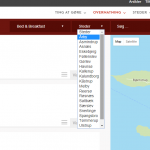This thread is resolved. Here is a description of the problem and solution.
Problem: The options shown in a View filter should be in alphabetical order, but the Danish characters like Å, æ and ø are not sorted correctly.
Solution: Check your database configuration. MySQL sorts differently based on the collation type, and utf8_danish_ci is probably best for your site.
This is the technical support forum for Toolset - a suite of plugins for developing WordPress sites without writing PHP.
Everyone can read this forum, but only Toolset clients can post in it. Toolset support works 6 days per week, 19 hours per day.
| Sun | Mon | Tue | Wed | Thu | Fri | Sat |
|---|---|---|---|---|---|---|
| 8:00 – 12:00 | 8:00 – 12:00 | 8:00 – 12:00 | 8:00 – 12:00 | 8:00 – 12:00 | - | - |
| 13:00 – 17:00 | 13:00 – 17:00 | 13:00 – 17:00 | 13:00 – 17:00 | 13:00 – 17:00 | - | - |
Supporter timezone: America/New_York (GMT-04:00)
This topic contains 2 replies, has 2 voices.
Last updated by 6 years, 9 months ago.
Assisted by: Christian Cox.
